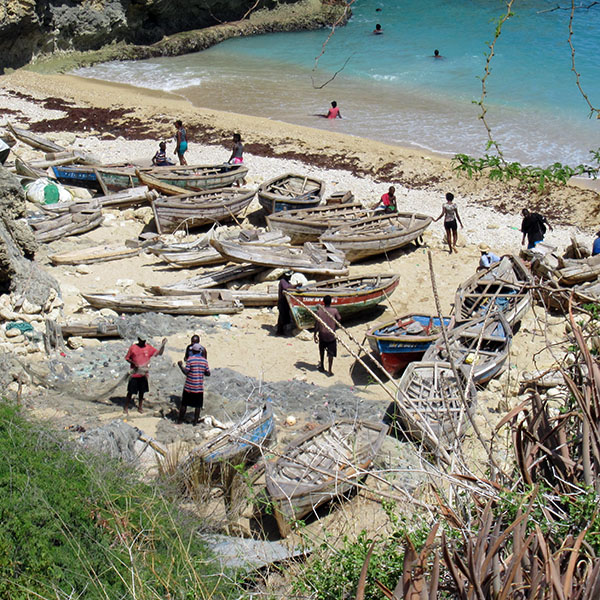Stories of Change

Members of APKF at the port of Rivière Côtes de Fer, returning from a morning of fishing before meeting with the CWS team.
Focusing on fishing families in Haiti
Despite being an island nation, Haiti has a neglected fishing sector.
The Ministry of Agriculture reports that more than 52,000 Haitian families rely on fishing to make a living. For the most part, though, these families are going at it alone in the face of mounting odds and stiff competition.
The Haitian government doesn’t regulate who can fish where, what size fish can be or how to protect coastal ecosystems. This entices fishers from the Dominican Republic, Jamaica and Cuba to fish in Haitian waters. These fishers usually have access to bigger boats than their Haitian counterparts, leading to a faster depletion of fish populations and heavier environmental tolls.
Because of the deep poverty in many parts of rural Haiti, fishing families usually only have canoes or small paddle boats. That means that they can only fish close to shore. With everyone fishing in the same stretch of ocean, coastal areas are overfished, and young fish do not have a chance to develop before being caught. Coastal resources are overexploited, but the open ocean is underused.
Some nonprofit organizations have attempted to help Haitian fishers in the past by providing boats or installing a system to attract fish. For the most part, though, the fishing sector isn’t one that most organizations have gotten involved in supporting, and no one seems to be focusing on community associations of fishing families.
We’re changing that through our new Fishing & Farming program in the Northwest Department, the region of Haiti with the highest rates of hunger and food security.
Our team has a longstanding partner in the Northwest Department called GRADAID, or the Group of Research and Support for Agroecological, Innovative, Durable Development. We’ve worked with GRADAID for years to help support farmers and rebuild homes destroyed in Hurricane Matthew. Now, we’re teaming up with them again for the Fishing & Farming program.
We’ve identified an association of fishers in the town of Côtes de Fer. It has 58 members, who rely on fishing to provide for their families. The association is known as APKF.
The members of APKF already look out for each other. They start fishing before dawn each morning and wait for the last fisher to return at the end of the day before they leave the port. If someone doesn’t show up, they go to look for them before they go home. They also follow the news together and share information about weather advisories and warnings. Most importantly, they are excited to learn and improve their fishing practices together.
With support from CWS and Growing Hope Globally, GRADAID is going to provide materials and training to APKF and its members. A critical component of this program is the direct involvement of all members; too often in Haiti donated supplies end up in the hands of the local leadership and do not make it to the families who need it most. The idea and request for this support came from the community members themselves, and they already have the association in place to keep things organized and accountable. Training and information sessions will be open to all 58 families. And when supplies like boats, engines, freezers and fish aggregating devices are distributed, it will be in front of the whole association.
We’re also teaming up with APKF to improve their structure and capacity. We’ll be supporting training sessions for their members on administrative basics, and we’re helping them set up a couple of committees so that more members are directly engaged. One committee will oversee sales, and another will oversee storage, inventory and maintenance of materials. The first year of the program will focus on training and getting the committees and systems in place. Then we will begin providing materials and equipment.
Meanwhile, GRADAID will be launching advocacy efforts to encourage government officials to consider regulations that will protect both the Haitian people and their environment.
There’s a lot of work to be done alongside Haitian families who rely on fishing. We’re excited to be taking these first steps with your support.
